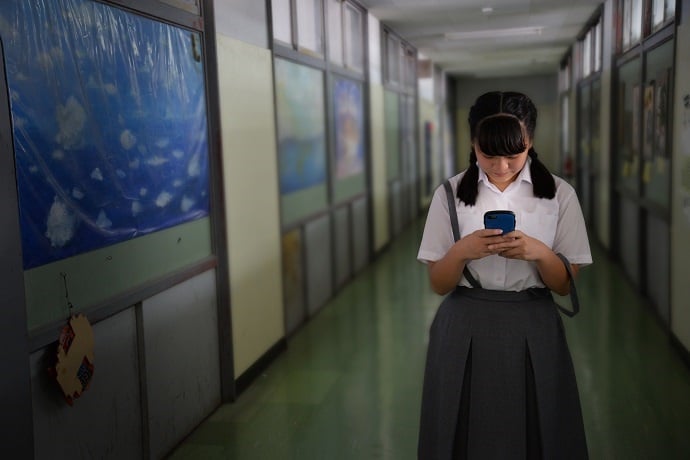
UK-based cyber-safety company, SafeToNet, has revealed alarming data taken from more 65 million text messages sent by children aged 14 and younger.
Using AI technology, SafeToNet screens messages and provides its young users with "in-the-moment" advice aimed at protecting them against "sexting, bullying, abuse and aggression."
Recently, the company shared that its bots had picked up on words like 'peri peri' and 'coleslaw' being used as code language for sexual references, and that preteen girls were the most frequent users of the terms.
"As well as overtly graphic terms, they use 'peri peri' to mean a well-endowed male and 'coleslaw' to mean a bit on the side," Richard Pursey, founder of the safety service told The Guardian, also adding that the language was used mostly among girls in group chats with their female friends.
- Why sexting must be on the school curriculum
- 1 in 7 teens are sexting – do we really know what our kids are getting up to?
- Does sex education in childhood harm people into adulthood? A psychologist weighs in on sex ed at schools
'Little more than kids trying to keep up with keeping in'
We asked local psychoanalyst, Enzo Sinisi if he's ever come across preteens using code language to refer to sex or sexual acts, and whether or not parents should be worried.
Admitting that while he's not consulted with many preteens, in his experience, there's no need for parents to be alarmed since the reasoning behind the use of 'code words' may be more innocent than we think.
"What seems like a deliberate attempt to evolve a secret sex language may be little more than kids trying to keep up with keeping in... none of the preteens that I have worked with have shown evidence of a secret sex language beyond the use of slang," Sinisi says.
Yet at the same time, Sinisi adds that one shouldn't assume that "it doesn't happen and parents shouldn't be vigilant."
So while Sinisi hasn't seen preteens or teens using "a secret sex language beyond the use of slang," what the psychoanalyst has noted is that "12 seems to be the new 13 and adolescence does appear to be starting earlier."
Should parents be worried?
Sinisi suggests that parents view this new information as one of the many risks that come part and parcel of technology and just another reason for adopting "an open and honest attitude towards sex" when raising the topic with your child.
"Your aim is to create an environment in which they feel safe to talk about these things without that environment being overly permissive. This means, displaying the ability to answer questions in a calm, matter of fact way that does not leave the child with the sense that something is being hidden (and so excite curiosity and excitement) and that remains age-appropriate."
It's a fine line to walk, Sinisi admits, since being either too strict or too relaxed can have similar effects.
"Being super stern can incite rebellion and push things underground. Being overly permissive and without boundaries leaves your children unprotected. Striking a balance keeps the lines of communication functioning for as long as possible."
I found sexually inappropriate material on my child's phone, what should I do?
If you've discovered unsuitable material on your child's phone, Sinisi says the best approach is simply to sit them down for a talk, bearing in mind not to shame them. He suggests parents stick to these questions as a guideline. Ask them:
- Who is sending the material?
- Do their parents know?
- Is it an adult?
- Was anything requested?
- Do they think it is right or wrong, and why?
- Do they appreciate the consequences, such as knowing how easily material can go viral and that it might be unremovable?
If you find yourself unclear of where to go from there, Sinisi says to always highlight consequences and boundaries and to ultimately "allow your values to guide you" when discussing these things with your child.
"Remember, sexuality is normal, even in children, but children require guidance and are vulnerable. They need our help to keep themselves safe and their behaviour appropriate," concludes Sinisi.
Chat back:
Share your story with Parent24. Anonymous contributions are welcome.
WhatsApp: Send messages and voicenotes to 066 010 0325
Email: Share your story with us via email at chatback @ parent24.com




 Publications
Publications
 Partners
Partners











